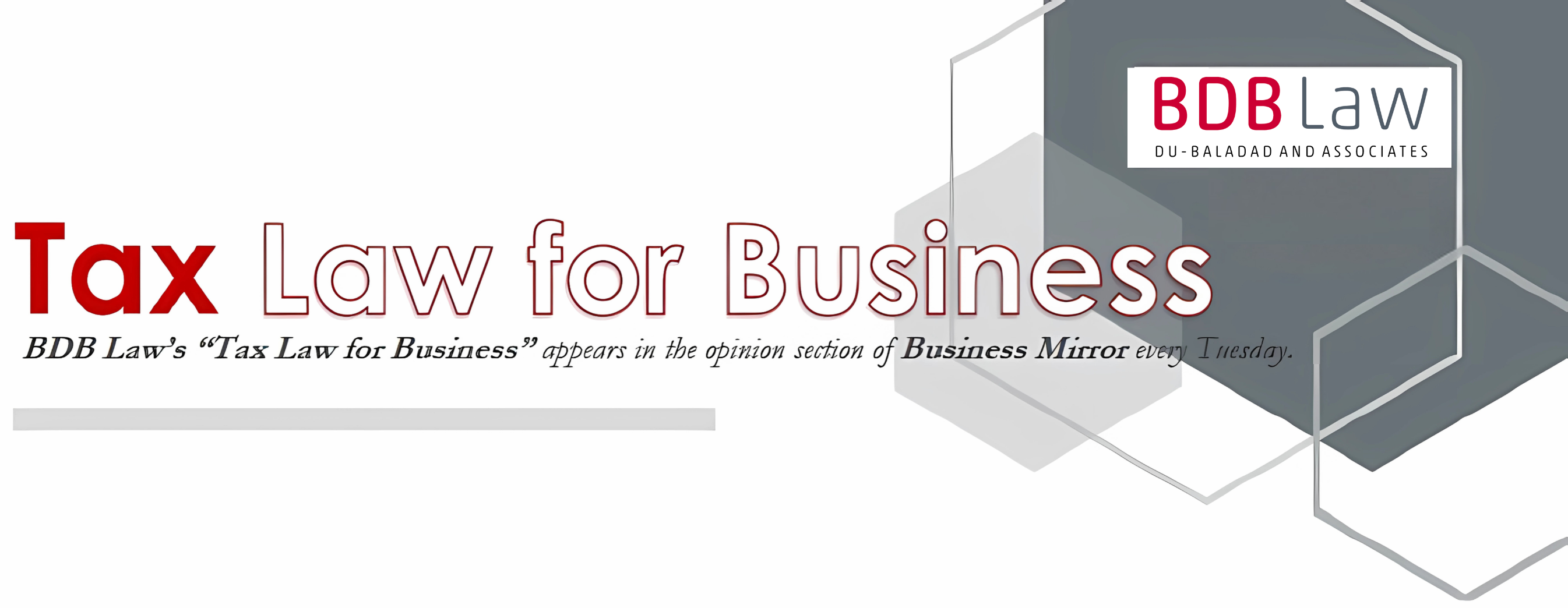
Revised Guidelines on the Requirements for Tax Exemption of
Retirement Benefits
"To be considered a reasonable retirement benefit plan, a retirement plan must have a written program setting forth all provisions essential for qualification. It must be a permanent and continuing program unless sooner terminated by virtue of a valid business reason. Also, it must cover at least seventy percent (70%) of all officials and employees. If the plan provides eligibility requirements and at least seventy percent (70%) of all officials and employees meet the eligibility requirements, at least eighty percent (80%) of those eligible must be covered."
Atty. Rodel C. Unciano
Partner
+632 8403-2001 loc.380
This email address is being protected from spambots. You need JavaScript enabled to view it.
View Profile
|
Under Section 32 of the Tax Code, retirement benefits received by officials and employees of private firms, in accordance with a reasonable private benefit plan maintained by the employer shall be exempt from income tax, subject only to compliance with certain conditions among which are: 1) the retiring official or employee has been in the service of the same employer for at least ten (10) years; 2) the retiring official or employee should not be less than fifty (50) years of age at the time of his retirement; and 3) the tax exempt benefits shall be availed of by the retiring official or employee only once.
In relation thereto, pursuant to Section 60 of the Tax Code, the earnings of the fund may likewise be exempt from income tax provided that: 1) the contributions are made to the trust by the employer, or employees, or both; 2) such contributions are made for the purpose of distributing to such employees the earnings and principal of the fund accumulated by the trust in accordance with such plan; and 3) under the trust instrument it is impossible for any part of the corpus or income to be used for, or diverted to, purposes other than for the exclusive benefit of the employees.

Thus, as summarized under Revenue Regulations 15-2025, a retirement plan which is duly approved by the Bureau of Internal Revenue (BIR) and was issued a certificate of tax qualification for tax exemption is entitled to the exemption from income tax and withholding tax on the retirement benefits received by officials and employees on account of their retirement. Also, trust income from various investments made by the trustees of an employee's trust shall be exempt from income tax and, consequently, from withholding tax.
To be considered a reasonable retirement benefit plan, a retirement plan must have a written program setting forth all provisions essential for qualification. It must be a permanent and continuing program unless sooner terminated by virtue of a valid business reason. Also, it must cover at least seventy percent (70%) of all officials and employees. If the plan provides eligibility requirements and at least seventy percent (70%) of all officials and employees meet the eligibility requirements, at least eighty percent (80%) of those eligible must be covered.
With respect to investments which may be made, the fund may be used by the trustees to purchase any investments permitted by the trust agreement. However, the exemption of the trust income may be denied if the trust: 1) lends any part of its income or corpus without adequate security and a reasonable rate of interest; 2) pays any compensation in excess of a reasonable allowance for salaries or other compensation for personal services actually rendered; 3) makes any part of its services available on a preferential basis; 4) makes any substantial purchase of securities or any other property for more than adequate consideration in money or money's worth; 5) sells any substantial part of its securities or other property, for less than an adequate consideration in money or money's worth; or 6) engages in any other transaction which results in a substantial diversion of its income or corpus.
The Retirement Fund shall not be used to invest/deposit in any of the employer's business ventures to maintain the separation of the employee's trust fund from that of the employer's trust.
Pursuant to Revenue Regulations 15-2025, the employer shall apply with the BIR, through the Legal and Legislative Division at the National Office, for the issuance of a certificate of qualification for tax exemption of the employee retirement benefit plan within thirty (30) days from the date of the effectivity of the retirement benefit plan. The issued certificate of qualification shall retroact to the date of the effectivity of the Retirement Plan and shall be valid until revoked by the BIR.
However, should the application of the employer be denied by the BIR, the employer/trust shall be directly and solely liable for any deficiency income taxes due. Also, during the period that the Retirement Plan is in operation, amendments thereto that may be introduced should also be submitted to the BIR for certification that the amendment/s do not affect the qualification of the Retirement Plan. If found to be beneficial to the employee-members of the Retirement Plan, an amendatory certification of qualification shall be issued by the BIR.
Compliance with the requisites is a must in order to avail with the tax exemption privileges provided under the law.
The author is a partner of Du-Baladad and Associates Law Offices (BDB Law).
The article is for general information only and is not intended, nor should be construed as a substitute for tax, legal or financial advice on any specific matter. Applicability of this article to any actual or particular tax or legal issue should be supported therefore by a professional study or advice. If you have any comments or questions concerning the article, you may e-mail the author at This email address is being protected from spambots. You need JavaScript enabled to view it. or call 8403-2001 local 380.


 Thus, as summarized under Revenue Regulations 15-2025, a retirement plan which is duly approved by the Bureau of Internal Revenue (BIR) and was issued a certificate of tax qualification for tax exemption is entitled to the exemption from income tax and withholding tax on the retirement benefits received by officials and employees on account of their retirement. Also, trust income from various investments made by the trustees of an employee's trust shall be exempt from income tax and, consequently, from withholding tax.
Thus, as summarized under Revenue Regulations 15-2025, a retirement plan which is duly approved by the Bureau of Internal Revenue (BIR) and was issued a certificate of tax qualification for tax exemption is entitled to the exemption from income tax and withholding tax on the retirement benefits received by officials and employees on account of their retirement. Also, trust income from various investments made by the trustees of an employee's trust shall be exempt from income tax and, consequently, from withholding tax. 


